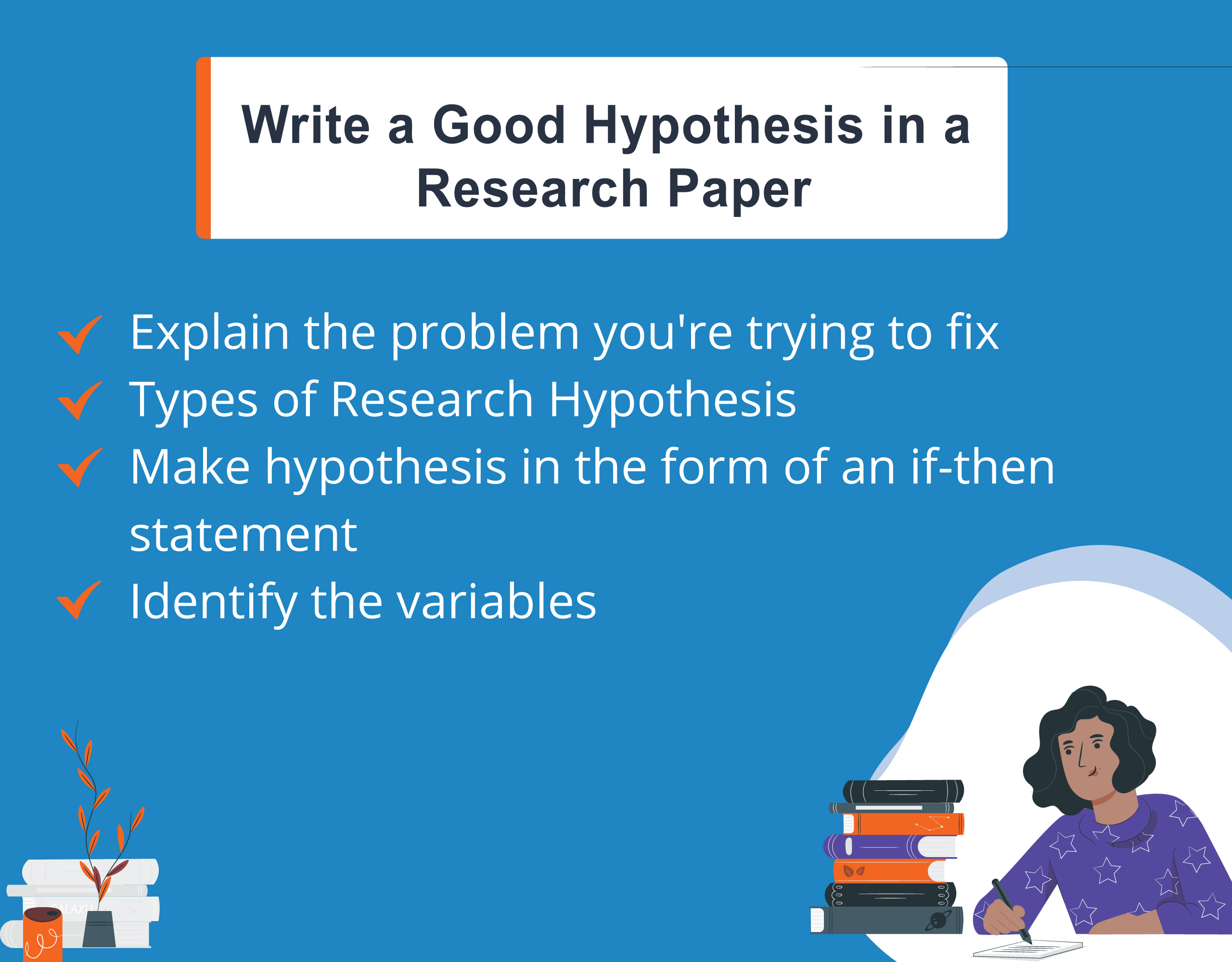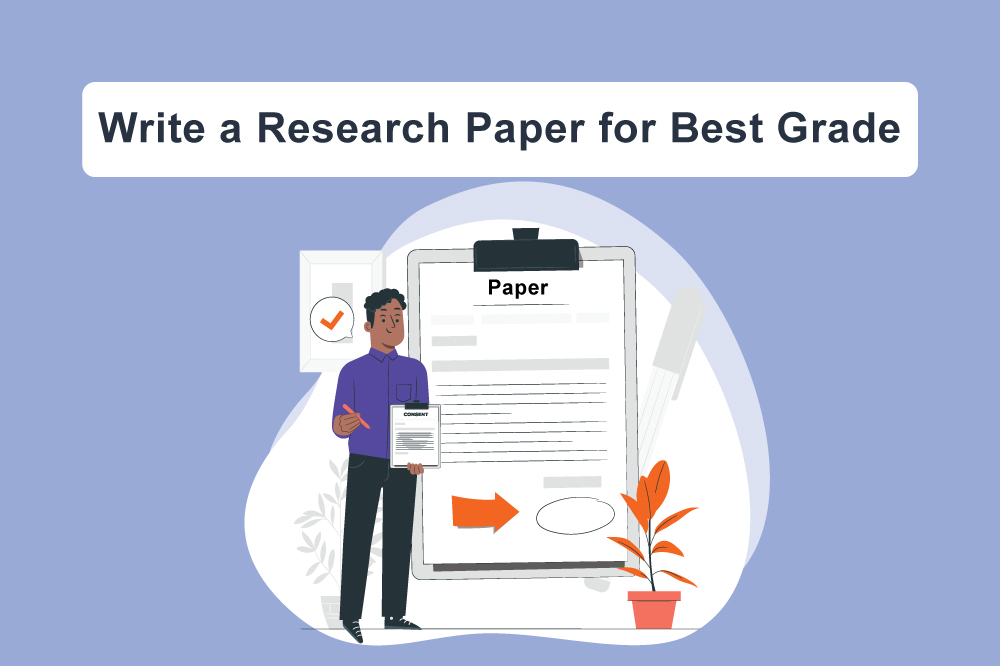Asking a question is the first step in conducting a study. Interesting questions and research hypotheses are being asked and developed by scientists worldwide. However, the study’s findings’ strength hinges on the research hypothesis’s quality. Researchers may benefit from examining examples of research hypotheses to learn the fundamentals of creating a strong research hypothesis.

What Is A Research Hypothesis?
A hypothesis is a research question that states what is expected to be the result of the study. A hypothesis is necessary for any experiment in science or research. Therefore, you should be deliberate and thorough in constructing your hypothesis before committing it to paper. A poorly constructed hypothesis can have a devastating effect on the quality of an experiment and its results if it is not carefully and thoughtfully crafted.
Difference between Hypothesis and Thesis
Thesis and hypothesis are two of the most common terms in the research study. A hypothesis is a tentative statement of fact predicated on existing information that serves as a jumping-off point for additional study. A thesis is an argument’s main or central claim that must be defended and demonstrated. A thesis can be found in any research study, while a hypothesis is something that can only be found in experimental quantitative research.
It is possible to either confirm or refute a hypothesis. Quantitative researchers frequently employ this method to predict the dynamics between different variables.
Simply put, the thesis statement of an essay or research paper is the single, overarching claim made by the author(s). It appears in studies employing both quantitative and qualitative approaches. The body of an essay or research report is where the thesis statement is elaborated upon, backed up by evidence, and explained to the reader.
Every piece of research needs to have a clear and concise thesis statement. The research report will include a hypothesis statement if the study aims to prove or disprove something.
Difference between Hypothesis and Research Question
Research questions and hypotheses are easily confused with one another. Both are crucial steps in the Scientific Method but differ in important ways. Like a hypothesis, a research question is primarily focused and brief. Conversely, a hypothesis is a prediction that attempts to foretell the relationship between two (or more) variables and is based on the proposed research. However, closed hypotheses like “The relationship between A and B will be C” do not encourage discussion and debate like open research questions.
If you have a well-defined research topic and a good idea of how your variables will be interrelated, then you can use a hypothesis to guide your study. The very existence of a hypothesis will affect how you create your experiment.
This type of inquiry is frequently used for novel, unexplored subjects. In this case, it is harder to see how the various factors are related. While we can’t make predictions, we can look into potential factors. There are many different types of research questions that can be asked.
What Makes a Good Hypothesis for a Research Paper
The hypothesis makes a particular prediction about the outcome of an experiment, making it amenable to testing. Create hypotheses based on the theory and existing research that supports them.
- Developing a solid research hypothesis requires more work than simply taking a stab in the dark. Specifically, you may pose a question in your hypothesis that can be investigated further during your reading and thinking.
- Many experts in the writing profession feel that a hypothesis’s strength and efficacy may be improved by emphasizing a few key features. The following are examples of these traits:
- To be believable, the hypothesis should be explicit and specific.
- It should be evident whether you have picked a hypothesis type that will state the link between the two variables.
- A strong hypothesis is particular and has a clear scope for further research and testing.
- The hypothesis must be explained plainly. Remember that the hypothesis’s simplicity has nothing to do with its relevance.
- Only a compelling hypothesis will entice readers to read the full work. As a result, make certain that you carefully establish a hypothesis for your investigation.
How to Write a Good Research Hypothesis
A testable hypothesis is more than simply a statement. It is a somewhat detailed statement that must provide a clear introduction to a scientific investigation, its aims, and potential consequences. However, certain critical factors must be considered while developing a persuasive hypothesis.
Step 1: Explain the problem you’re trying to fix.
Always refer back to the hypothesis to ensure that you have a clear understanding of the experiment’s purpose.
Step 2: Make an effort to express the hypothesis in the form of an if-then statement.
Use this outline as a guide: A predetermined outcome is expected if a specific course of action is taken.
Step 3: Identify the variables
Manipulated, controllable, and modifiable variables are known as independent variables. Separating independent variables from other factors is a crucial part of the study design.
The label “reliant” suggests that these variables rely on something else to be calculated. When the independent variable shifts, it affects them.
Types of Research Hypothesis
7 Types of hypotheses for scientific study have been identified which are as follows.
-
Simple Hypothesis
It is used to predict the correlation between a single dependent and independent variable.
-
Complex Hypothesis
It is used to foretell how independent and dependent variables are related to one another.
-
Directional Hypothesis
It is theoretically generated and provides the preferred path toward establishing the connection between variables. In addition, it shows how seriously the researcher takes an issue.
-
Non-Directional Hypothesis
It does not foresee the way the connection will go or its form. In cases where there is no relevant explanation or when new evidence directly contradicts previous studies, a neutral hypothesis is used.
-
Associative and Causal Hypothesis
The associative hypothesis defines interdependency between variables. When you alter one, you must also alter the other. The causal hypothesis, on the other hand, suggests an influence on the dependent as a result of manipulating the independent variable.
-
Null Hypothesis
The researcher’s conclusion that no correlation exists between two variables is supported by the null hypothesis, a negative statement. Changing the independent variable won’t change the dependent one. What’s more, it claims that the outcomes are merely coincidental and, as such; don’t do much to bolster the hypothesis being evaluated.
-
Alternative Hypothesis
This section explains why the study’s findings are important and how the two variables are related. The experimental hypothesis states the expected change in the dependent variable as a function of the change in the independent variable. More importantly, it claims that the findings provide substantial evidence in favor of the hypothesis being tested. We can’t skip over the procedures we just went through.
A robust, testable hypothesis is essential to the reliability of your experiment and its results. There aren’t many benefits to developing a robust, testable hypothesis other than the fact that it makes us think carefully and specifically about the potential outcomes of an experiment. This allows us to fully grasp the significance of the posed question and the myriad factors in this investigation. Additionally, this facilitates the development of well-informed predictions based on existing data. Consequently, it would serve the research very well to formulate a hypothesis. Here are some examples of plausible hypotheses that can be tested.
Moreover, before beginning your scientific experiments, you should construct a robust, falsifiable research hypothesis. A hypothesis is considered testable if it can be verified or refuted by empirical evidence.
Data Collection for Research Hypothesis
Once a researcher has a hypothesis that can be tested, they can move on to selecting a research strategy and collecting data. The research strategy is highly topic-dependent. Research methods can be categorized into two broad categories: descriptive and experimental.
Research Techniques for a Descriptive Study
Case studies, naturalistic observations, and surveys are all examples of descriptive research methods that are used when conducting an experiment that would be impractical or impossible.
These techniques shine when used to elaborate on various facets of behavior or psychological phenomenon.
Once descriptive data has been collected, it can be used with a correlational analysis to reveal the interconnections between the various factors. Using this strategy, researchers could look into a hypothesis that would be hard to test in the lab.
Experimenting Research Methods
Experiments are used to prove that there is a connection between two variables. The goal of an experiment is to determine the effect of a change in one variable (the independent variable) on a second (the dependent variable).
The nature of the relationship between two variables can be determined through experimental methods, while correlational studies can only establish the existence of a relationship.
Example Hypothesis for Research
Looking at how your hypothesis stacks up against the rest of the research in your field is probably the best way to test its validity. No need to reinvent the wheel when crafting a solid research hypothesis. As you research and organize your hypothesis, you will inevitably come across those of others. These can serve as useful examples of good and bad research hypothesis writing to help you determine what to include in your own.
Here are some basic examples to help you get going.
After age 60, eating an apple daily can reduce the number of times you need medical attention.
Discount airlines have a higher rate of customer complaints. Compared to full-service airlines, those in the budget travel category offer lower fares and fewer extras. (The phrase “budget airline” is included in the hypothesis.)
Employees report greater happiness in their work lives when their schedules are more malleable. –
All of the above examples are concrete in that they can be observed and measured, and their predictions can be tested using standard experimental methods; however, it’s important to keep in mind that your hypothesis will likely evolve as your investigation continues.
Bottom Line
An essential part of any scientific inquiry, the hypothesis states what scientists anticipate discovering as a result of their study or experiment. Research is valuable even if it does not confirm a particular hypothesis because it increases our knowledge of the interplay between various components of the natural world and aids in formulating new hypotheses for future investigation.
Frequently asked questions-FAQs
-
Can a prediction be derived from a hypothesis?
No, a hypothesis is a possibility, not a prediction. Through experimentation, the researcher “hopes” to obtain a particular sort of result. The hypothesis is this possible or anticipated result.
-
How long should a hypothesis typically be?
A good rule of thumb for a succinct and direct hypothesis statement is to limit it to no more than 20 words. A successful hypothesis is one that can be tested. In other words, students must ensure that their hypotheses contain information on their intended outcomes and methods.
-
What precisely is a bad hypothesis?
A hypothesis indicating that something “could” have an influence on something else suggests that you lack the confidence to make a definitive declaration; in this instance, you cannot expect your readers to have faith in your research.





